15 Amazing Food Storage Containers That Aren’t Plastic Wrap

After you spent the last hour whipping up a healthy dinner, just looking at the leftovers piled in pots and pans leaves you exhausted.
Clean up is the worst. Why can’t those leftovers magically put themselves away? You want to wrap those extra veggies, that half of an avocado, and that leftover pasta in the bowl in plastic wrap and go binge watch Netflix.
But even though the undeniable convenience of plastic wrap pulls at you, you know you won’t use it. (You’d give yourself a guilt complex for days.)
“More people are realizing every day that the plastic they throw away has long-lasting consequences for our oceans, our soil, our drinking water supply, and the health of our bodies and our planet,” says Sarah Kaeck, founder of Bee’s Wrap, which makes reusable organic cotton wrap as an alternative to plastic wrap. “If we don’t make changes to the amount of plastic we’re consuming as a society, we’re on track to see more plastic than fish in the oceans by 2050.”
One study found that of the 6.3 billion metric tons of plastic waste we’ve generated, only 9 percent has been recycled, only 12 percent has been incinerated, and the vast majority—79 percent—has built up in landfills or the natural environment.
And one-time use plastic wrap and baggies have much to do with that problem.
“Plastic wrap or sandwich baggies are used for such a short period of time. And they’re difficult (and impossible, in some places) to recycle,” Kaeck says. “Most end up in the trash. And then, despite being used for just a brief period in one’s home, they persist forever in our environment.”
So, What’s That Plastic Wrap Doing to Your Health?
Besides adding unnecessary waste to the world, storing food in single-use plastic means worrying about your health.
“I always knew that plastic was crappy for the environment. There’s no evidence to suggest it ever biodegrades. But until my wife and I had kids, I didn’t really consider what effect it had on our health,” says Steve Reble, Co-Owner of etee (Everything Touches Everything Else), which makes beeswax and essential oil reusable food wraps.
“A little bit of time and digging taught me that it may also leach toxins into our food, which means we’re ingesting it,” he says. “While we wait for 100 percent confirmation from the scientific community, I’d rather keep plastic off my boys’ food.”
Kaeck says she also felt concern about the health effects of plastic. “I was worried about the implications of plastic for both my family’s health and the health of the planet,” she says of why she wanted to eliminate plastic wrap from her kitchen.
Here Are 15 Insanely Easy Ways to Store Food That Aren’t Plastic Wrap
Move over plastic wrap. So many better, more sustainable options exist. And many of these already live in your kitchen.
1. Mason jars
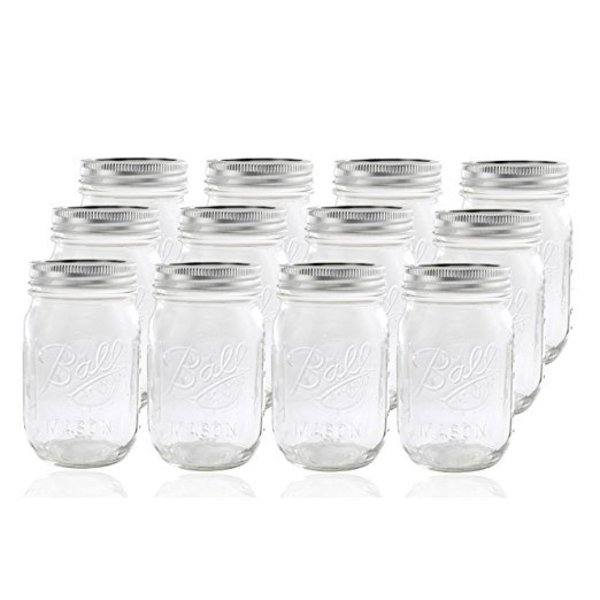
Oh, the mason jar. What can’t it do?
Mason jars work great as food storage containers. Whether you’re putting away the leftovers from dinner or storing dry goods, like rice, beans, and flour.
“We use a lot of mason jars and glass jars at home,” Kaeck says.“They last forever, are perfect for transporting beverages or soups, and serve all kinds of purposes in our kitchen.”
Reble also uses mason jars regularly. “My favourite (We’re Canadian. We add extra ‘u’s whenever we can.), plastic-free food storage—aside from etee—hands down is the glass mason jar,” he says. “Every single day I make a giant batch of smoothies and split it up into multiple jars for the fam to share. I’d be lost without my mason jars.”
2. Leftover jars from other food
Guess what? You don’t need to buy anything new to get awesome food storage containers.
Head out to your recycling bin and grab your extra glass jars from pickles, olives, pasta sauce, and salsa.
These glass jars work perfectly to store leftovers, homemade soups, and drinks.
3. Glass food storage containers

Recycle your plastic food storage containers and never look back.
You have a way better option: Glass.
Glass food storage containers last longer than plastic. You don’t have to worry about any potential contamination from your food touching plastic. And you can easily reheat food in the same container. What’s not to love?
4. Stainless steel food storage containers
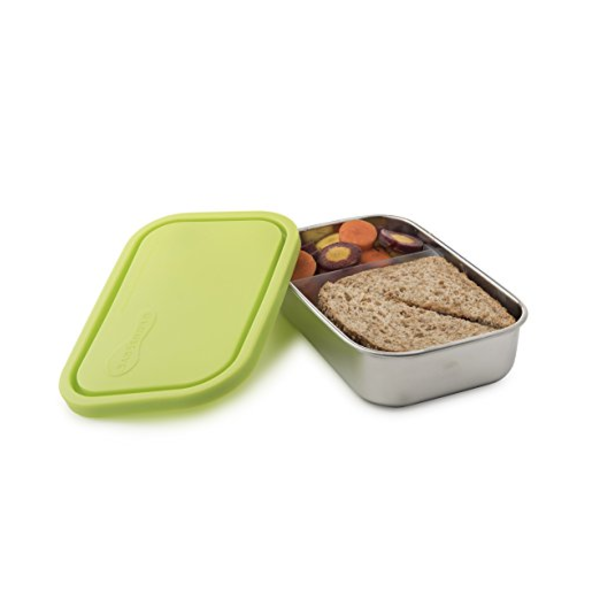
Keep your food extra cold with reusable stainless steel food storage containers.
They’re great for packing lunches, like sandwiches, salads, and cut fruit. And these handy stainless steel food storage containers from U-Konserve even include dividers.
5. Two plates or bowls
Sandwich your leftovers between two plates or two bowls and stick them in the fridge.
This method is especially useful if you want to make up a plate of food to store for later. Grab it out of the fridge, take off the top plate, heat it up, and enjoy.
6. Wax paper
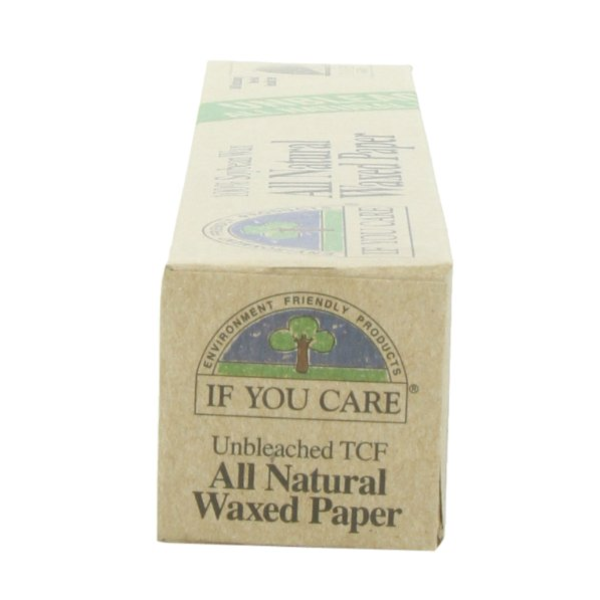
If you already have wax paper in your kitchen, use it as a better alternative to plastic wrap.
Clean off the wax paper and reuse it multiple times. But when it comes to the end of its life, you have limited options.
Recycling wax paper is a no-no because it’s coated in, well, wax. And wax doesn’t mix well with the water-based recycling process.
And, you can drop wax paper in your compost pile, but only if you have a soy-based, biodegradable wax paper. (You don’t want paraffin wax in your compost. Yuck!)
7. Aluminum foil
While you don’t want to use aluminum foil all the time for food storage (that’s not very sustainable), this shiny kitchen staple works well in a pinch.
Rinse off any food residue and you can reuse a piece of aluminum foil multiple times. And some curbside recycling programs even accept it. (Hint: Clean it off first.)
8. Paper bags
Use paper bags to store fragile produce in the fridge, like berries, dates, and figs. Paper bags also work well to ripen produce. Speed up ripening by placing avocados, tomatoes, and pears in paper bags and set them on the counter.
Paper bags aren’t super reusable but you can compost them.
9. Dish towels
Need to keep a salad cool while you finish making dinner? Covering a plate or a bowl in a dish towel works great for short-term food storage.
10. Cheesecloth
Besides using cheesecloth to make your own ghee butter or cold brew coffee, you can also use it to store foods that need a little ventilation, like certain produce and herbs. And cheese, of course.
11. Cloth napkins
Wrap up sandwiches, fruits and veggies, and pretty much any food that’s not liquid, in a cloth napkin for quick storage.
12. Fabric bowl covers
You already have a bunch of bowls. So, why buy more food storage containers?
Use bowls and fabric bowl covers for simple food storage. Cover berries, pasta, a salad, and whatever else with a fabric bowl cover and you’re good to go.
Tons of fabric bowl cover options are for sale on Etsy. If you’re crafty, you can even sew your own.
13. Silicone suction lids
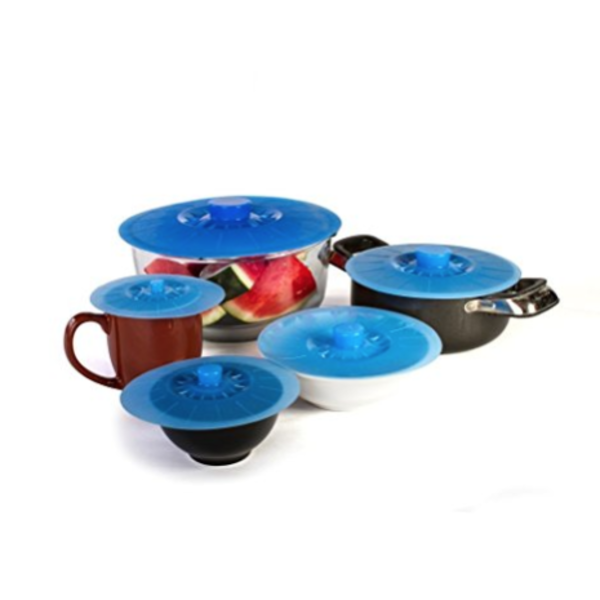
Silicone suction lids make food storage easy. Besides also being super fun to use. (Who didn’t play with suction cups when they were kids?)
These food covers come in a variety of sizes to fit different containers.
14. Silicone storage bags
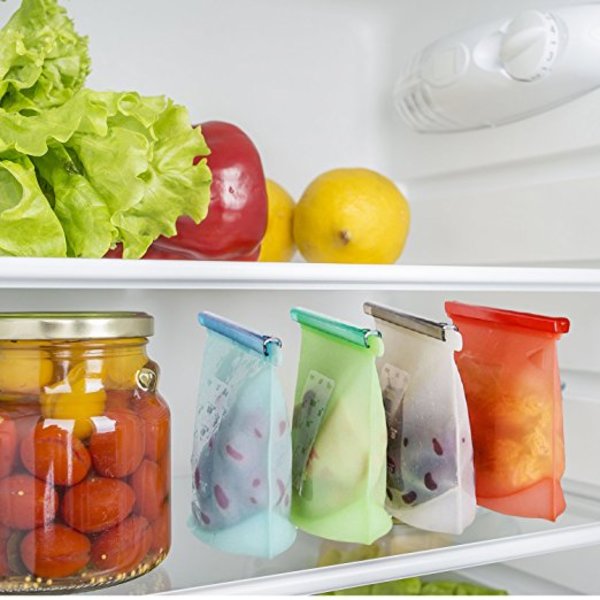
Need to store and freeze liquids, like soups and stocks? Reusable silicone storage bags are a good bet. And you can clean them in the dishwasher. Easy peasy.
Look for silicone storage bags made from food grade silicone. So they don’t contain any nasty fillers, coatings, BPA, PVC, or phthalates.
15. Reusable food wrap
Perhaps the ultimate plastic wrap alternative is reusable food wraps.
Made from organic cotton infused with beeswax and tree resin, reusable food wraps are a lovely way to store food. Just rinse and reuse. Over and over.
They come in varying sizes, so you can use them to pack a sandwich, wrap up half of an onion, and cover a casserole.
They also help keep food fresh. And can last up to a year.
The best part? When they’ve seen a little too much love, you can toss them in your compost pile.
The Reusable Food Wrap Brands We Love
Choose sustainable food storage that starts from the earth and returns to it. Artisans today are bringing back a lost tradition of using natural materials to create convenient food storage wrappings. Naturally biodegradable, reusable, and convenient. We want these in our kitchens.
Bee’s Wrap
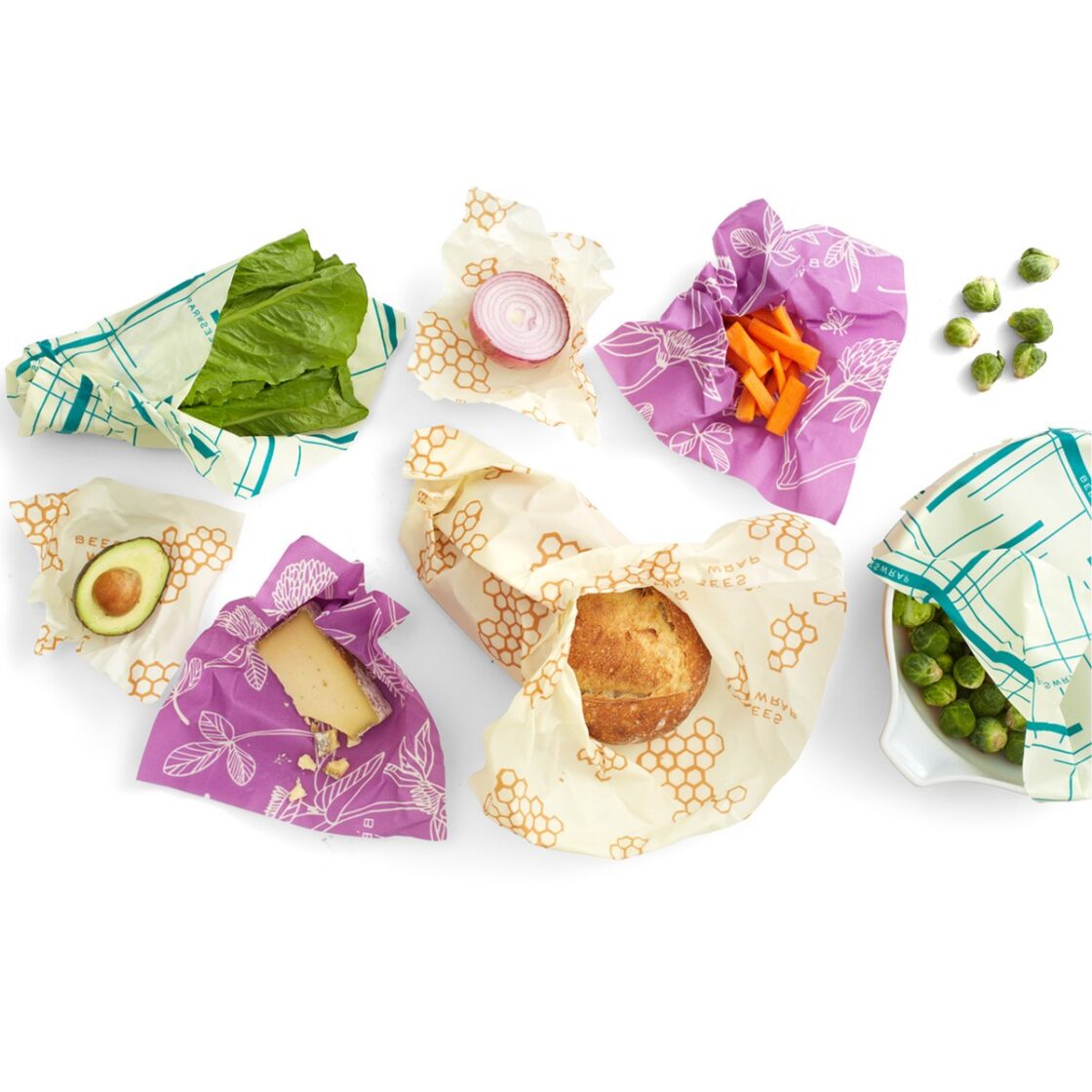
Bee’s Wrap food storage wraps are handmade in Vermont from organic cotton infused with beeswax, organic jojoba oil, and tree resin.
“We’ve designed these wraps to be used and reused, and they typically last for about a year with regular use in the kitchen,” Kaeck says. “And unlike plastic wrap, Bee’s Wrap is fully biodegradable. So when a wrap is ready to be retired from regular use, it can be composted (or cut up and used as a natural fire starter for your grill or fireplace.)”
And they not only store food, they help it last longer. “It keeps cheese and bread fresh; it’s perfect for wrapping up veggies and fruit; and it makes it easy to carry snacks and meals on the go in a lightweight, eco-friendly package,” Keyack says.
The pretty squares come in unique, fun designs. Each size has its own distinct pattern, so you can easily grab the size you need.
etee
Reusable food wraps are part of a plastic-free revolution, according to Steve Reble, Co-Owner of etee, which stands for Everything Touches Everything Else. The company handmakes reusable food wraps in Toronto.

“Etee wraps are a great alternative because they keep most food, such as organic produce, snacks, sandwiches, and leftovers, as fresh as plastic without the side effects,” Reble says.
The company’s food wraps use 10 parts beeswax to one part non-GMO soy wax and tree resin to form a tacky but not overly sticky seal. “Etee food wraps use organic and whole ingredients, and have a slightly different formula than other traditional beeswax food wraps,” he says. “This formula makes our wraps more pliable and tacky, which makes for an amazing seal when wrapping produce or topping a bowl.”
Etee crates its colorful food wraps with ribbed edging from organic cotton muslin fabric with non-toxic, eco-friendly dyes.
Besides smelling amazing, added organic jojoba oils and cinnamon and clove essential oils help keep food fresh. The food wraps aren’t recommended for raw meats or for long-term freezer use.
*Disclaimer: Help support Organic Authority! Our site is dedicated to helping people live a conscious lifestyle. We’ve provided some affiliate links above in case you wish to purchase any of these products.
Related on Organic Authority
7 Kitchen Gadgets Every Nutrition Nerd Needs
How To Make Reusable Versions Of The Top 13 Kitchen Staples
3 Tips for Storing Cheese Properly: Unwrap the Flavor

